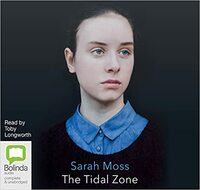You need to sign in or sign up before continuing.
Take a photo of a barcode or cover
2.5 stars. My second Sarah Moss and probably my last for the moment. I’m afraid to say that this author isn’t for me — although in both The Tidal Zone and Ghost Wall the writing has, on the whole, been extremely good, I’ve found them both pretty dull. I’ve mostly found that Moss is perceptive about British society and she very deftly goes into the cultural and economic divides that disadvantage us. But it’s all just a bit middle class for me, and that annoying kind of middle class that is self-deprecating and “oh what is to be done? I’ll mull it over while I enjoy some vintage wine on my holidays in the Italian mountains.” That’s all well and good because of course, everything is relative, but I have to say that I don’t find it very interesting reading.
.
.
The Tidal Zone begins with 15 year old Mimi collapsing in school, as part of her as yet undiagnosed medical issue. She spends 12 days in hospital, and during her stay and for some weeks after, we follow her precariously employed academic father and his worries about her health. He is married to Emma, the breadwinner in their family, who is very busy being a GP in an underfunded practice. They also have another daughter who is 8 and who I can’t remember the name of as I type this even though I finished it 2 hours ago which says enough. Intercepted with the story of their family life is the history of the father’s American and Jewish dad and his travels, and the academic work that he is researching on the Arts and Crafts movement in cathedrals. I *think* what Moss was getting at with these individual threads was the shared history of labour that unites us but I’m not too sure and don’t care enough to think about it too much.
.
.
The Tidal Zone begins with 15 year old Mimi collapsing in school, as part of her as yet undiagnosed medical issue. She spends 12 days in hospital, and during her stay and for some weeks after, we follow her precariously employed academic father and his worries about her health. He is married to Emma, the breadwinner in their family, who is very busy being a GP in an underfunded practice. They also have another daughter who is 8 and who I can’t remember the name of as I type this even though I finished it 2 hours ago which says enough. Intercepted with the story of their family life is the history of the father’s American and Jewish dad and his travels, and the academic work that he is researching on the Arts and Crafts movement in cathedrals. I *think* what Moss was getting at with these individual threads was the shared history of labour that unites us but I’m not too sure and don’t care enough to think about it too much.
emotional
reflective
tense
slow-paced
Plot or Character Driven:
Character
Strong character development:
Yes
Loveable characters:
Complicated
Diverse cast of characters:
No
Flaws of characters a main focus:
Yes
“Suddenly, but not really. There is always a beginning.”
4.5 stars. I absolutely loved this book. It's tender and beautifully written, with multidimensional characters that I felt an emotional connection with. Two things felt especially unique about this book: 1) climax happens at the beginning, and 2) the main character is a stay-at-home dad. I found the Coventry Cathedral chapters a bit distracting, but ultimately this was so readable and wonderful.
Das Familienleben der Goldschmidts ist nicht unbedingt konventionell - während seine Frau als Ärztin permanent Überstunden schiebt, hat Adam seine Karriere aufgegeben, um sich um die beiden Töchter und den Haushalt zu kümmern. Als die ältere Tochter Mimi eines Tages ganz plötzlich einen Herz- und Atemstillstand erleidet, ändert sich das Leben der Familie schlagartig.
Sarah Moss kann schreiben! Schon das erste Kapitel hat mich sprachlich komplett einnehmen können. Der Roman fängt den wahren Kern und die Bedeutung des täglichen Lebens ein und fasst sie in einem größeren Bild zusammen. Dabei schreibt Moss auf eine Weise, die poetisch und tiefgründig ist - mit einer Prise ironischem Humor.
Es ist eine Geschichte, die fest in den kleinen Details des Lebens verankert ist und gleichzeitig einige große Themen zu dem Zustand der Nation im 21. Jahrhundert aufgreift.
Sarah Moss kann schreiben! Schon das erste Kapitel hat mich sprachlich komplett einnehmen können. Der Roman fängt den wahren Kern und die Bedeutung des täglichen Lebens ein und fasst sie in einem größeren Bild zusammen. Dabei schreibt Moss auf eine Weise, die poetisch und tiefgründig ist - mit einer Prise ironischem Humor.
Es ist eine Geschichte, die fest in den kleinen Details des Lebens verankert ist und gleichzeitig einige große Themen zu dem Zustand der Nation im 21. Jahrhundert aufgreift.
reflective
slow-paced
Plot or Character Driven:
A mix
Strong character development:
No
Loveable characters:
Complicated
Diverse cast of characters:
No
Flaws of characters a main focus:
Complicated
dark
emotional
reflective
slow-paced
I started this stunning book knowing very little; only that it is about the relationship between a father and his daughter who collapses and stops breathing one day at school out of the blue, and that the handful of my Goodreads friends having reviewed it had all given it a five star rating. I didn't want to be swayed by the latter and am still struggling to decide whether to give it four or five stars.
Things I love about the book are;
-The parallel story lines (I'm a sucker for this kind of thing, like in Pan's Labyrinth etc). Moss juxtaposes the rebuilding of Coventry cathedral after its bombing during WW11 with the desecration of a family's feelings of security after their oldest daughter stops breathing one day, her body having failed her with no warning.
-The sensuous descriptions of everyday family life. Of food, nature, the beauty in small things.
-The pervasiveness of Adam's anxiety regarding his daughters' wellbeing after the 'incident', and how I felt it so strongly myself, always thinking that something tragic was about to happen.
-The constant rumination and the way the book makes you think think think. About the many layers of privilege, about gender roles, about what it means to be human. To be mortal and fragile and living in a nonsensical world.
I wouldn't say that it was a flawless book. Chapter titles like 'azure and purple and gold' seemed to me a bit contrived in their pursuit of an aesthetic response.
The ambiguous changes in perspective between Adam and his father telling his story distracted me slightly, but maybe just because I've been focusing on that stuff a lot as a creative writing student. Really I think Moss gets away with it.
I'm being picky, but there were also a few repeated ideas that packed more of a punch the first time around. Things like this sentence;
Just wow. I once covered a whole page of A4 trying to say what Moss captures right there in a line, (and she does this a lot, just gets it bang on, yanno?) I just thought the message was diluted when it cropped up again near the end.
Finally, I found myself relating to the family less near the end of the book. I felt sort of distanced from them and their intellectual and domestic privilege, but probably this was intentional. It was like Moss was leading me out of the front door, holding a plate of leftovers wrapped in tinfoil.
Four and a half stars, whatever, it's full of gems.
Update: Love it even more after this video of Sarah Moss talking about her book https://www.youtube.com/watch?v=gCSCwmJX5xQ
Things I love about the book are;
-The parallel story lines (I'm a sucker for this kind of thing, like in Pan's Labyrinth etc). Moss juxtaposes the rebuilding of Coventry cathedral after its bombing during WW11 with the desecration of a family's feelings of security after their oldest daughter stops breathing one day, her body having failed her with no warning.
-The sensuous descriptions of everyday family life. Of food, nature, the beauty in small things.
-The pervasiveness of Adam's anxiety regarding his daughters' wellbeing after the 'incident', and how I felt it so strongly myself, always thinking that something tragic was about to happen.
-The constant rumination and the way the book makes you think think think. About the many layers of privilege, about gender roles, about what it means to be human. To be mortal and fragile and living in a nonsensical world.
I wouldn't say that it was a flawless book. Chapter titles like 'azure and purple and gold' seemed to me a bit contrived in their pursuit of an aesthetic response.
The ambiguous changes in perspective between Adam and his father telling his story distracted me slightly, but maybe just because I've been focusing on that stuff a lot as a creative writing student. Really I think Moss gets away with it.
I'm being picky, but there were also a few repeated ideas that packed more of a punch the first time around. Things like this sentence;
It is a pity that the things we learn in crisis are all to be found on fridge magnets and greeting cards: seize the day, savour the moment, tell your love- May we live long enough to despise the cliches again [...]
Just wow. I once covered a whole page of A4 trying to say what Moss captures right there in a line, (and she does this a lot, just gets it bang on, yanno?) I just thought the message was diluted when it cropped up again near the end.
Finally, I found myself relating to the family less near the end of the book. I felt sort of distanced from them and their intellectual and domestic privilege, but probably this was intentional. It was like Moss was leading me out of the front door, holding a plate of leftovers wrapped in tinfoil.
Four and a half stars, whatever, it's full of gems.
Update: Love it even more after this video of Sarah Moss talking about her book https://www.youtube.com/watch?v=gCSCwmJX5xQ
Incredible writing. Engaging story. Brilliant character study. I need more Moss in my life, stat!






